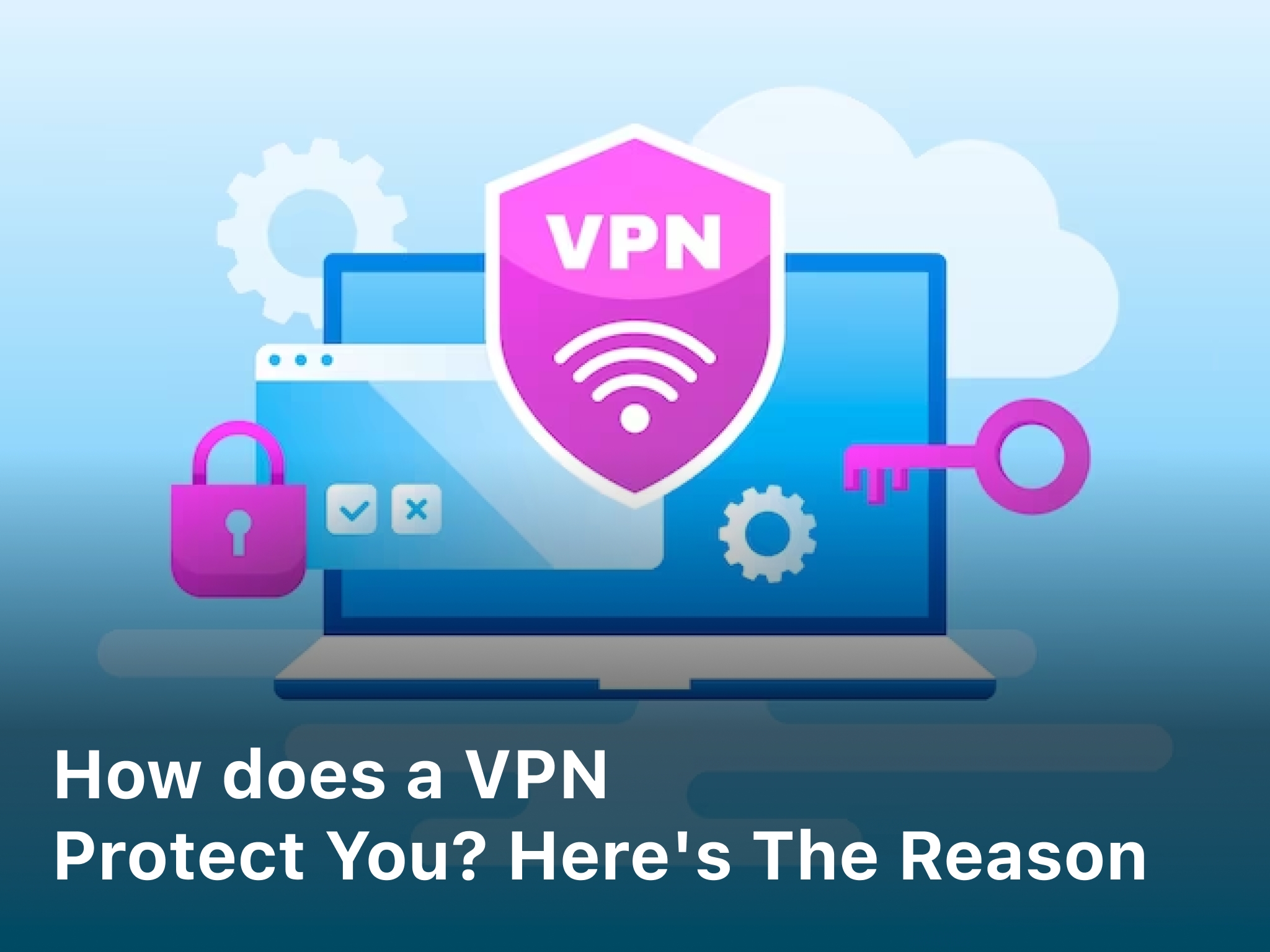How does a VPN Protect You? Here’s The Reason
You’ve probably been hearing about VPNs lately and wondering, how do they protect me? When you connect to public Wi-Fi networks in coffee shops and airports, browse websites, and access accounts, your online activities and personal information may be at risk. A virtual private network, or VPN, helps protect your privacy and security. By encrypting your internet connection and masking your online identity. So, can you be tracked by a VPN? online activity with a VPN helps ensure that what happens on the internet remains private.
How a VPN Protects Your Online Privacy
A virtual private network or VPN protects your online privacy and security in several key ways:
- Encrypts your internet traffic and hides your online activities. By encrypting all the data you send and receive on the internet, a VPN prevents others from seeing what websites you visit, what information you access, and what files you download.
- Masks your real IP address. A VPN gives you an anonymous IP address to mask your own IP address. This hides your real location and identity, preventing others from tracking your internet usage and behavior.
- Bypasses geographic restrictions. If there are certain websites or streaming services blocked in your location, a VPN allows you to connect to a server in another country and access content as if you were in that location. This enables you to avoid censorship and access the entire internet.
- Protects you on public Wi-Fi networks. Public Wi-Fi hotspots are notoriously unsecure. A VPN secures your connection and protects you from hacks like man-in-the-middle attacks that can steal your data on public networks.
- Prevents ISP throttling. Some internet service providers throttle or slow down your internet speed for certain activities like streaming video or file sharing. A VPN masks what you’re doing online, so your ISP cannot determine how to throttle your connection.
In summary, a VPN is an important tool for protecting your digital privacy and security. By encrypting your internet traffic, hiding your online identity and location, and securing your connection on public networks, a VPN gives you anonymity and peace of mind whenever you access the internet.
How a VPN Encrypts Your Internet Traffic
A virtual private network or VPN encrypts all of your internet traffic and hides your online activity. Here’s how it protects you:
When connected to a VPN, your internet traffic is sent through an encrypted tunnel before going out onto the public internet. This means that your online activity is hidden from anyone trying to snoop on your connection. VPNs use advanced encryption protocols to scramble your data, ensuring that no one can see what websites you access or steal your passwords and credit card numbers.
A VPN also masks your real IP address by assigning you a temporary IP address from the VPN server’s location. This hides your physical location and identity, making it appear as if your internet traffic is coming from the VPN server. This allows you to bypass geographic restrictions on content and access websites as if you were in another country.
In addition to encrypting your data and hiding your online identity, a VPN prevents others from seeing your online activities. Your internet service provider, network administrator, and government cannot see what websites you access or monitor how you’re using the internet. A VPN gives you complete online privacy and anonymity.
With data privacy and security becoming increasingly important, a VPN is a vital tool for protecting yourself online. By encrypting all of your internet traffic and hiding your identity, a VPN helps keep your personal data and online activities safe from prying eyes. For the ultimate in online privacy, a VPN is a service worth investing in.
How a VPN Hides Your IP Address and Location
How a VPN Masks Your Real IP Address
When you connect to the internet, your internet service provider (ISP) assigns you an IP address that identifies your location. This allows websites and services to determine your approximate location and track your online activities. A VPN masks your real IP address by assigning you a new IP address from the VPN server’s location. This makes it appear as if your internet traffic is coming from the VPN server.
For example, if you connect to a VPN server in the United States while traveling in Europe, websites will see the U.S. IP address and think you are located there. This hides your true location and identity, preventing location tracking and profiling. It also allows you to access geo-restricted content by circumventing regional blackouts.
Your Internet Traffic is Encrypted
Without a VPN, your internet connection is open and unencrypted. This means your ISP and anyone else can see what websites you visit and files you access. A VPN secures your connection by encrypting all the data transmitted between your device and the VPN server. This makes your internet traffic unreadable to outside parties, protecting your privacy and sensitive information.
Your Online Footprint is Concealed
How does a VPN Protect you, while Many websites and services track your online activities to build a profile of your interests and behaviors. They do this by logging your IP address, browsing history, and other details. A VPN prevents this type of tracking and profiling by hiding your real IP address and encrypting your internet traffic. Your online footprint becomes anonymous, making it difficult for trackers to tie your internet activities to your identity.
Using a VPN is an effective way to protect your privacy and security on public Wi-Fi networks and hide your online activities from your ISP. By masking your IP address, encrypting your traffic, and concealing your digital footprint, a VPN helps ensure your sensitive information remains private as you browse the internet.
How a VPN Bypasses Censorship and Content Restrictions

A VPN allows you to bypass censorship and access restricted content by hiding your online activity and location.
Concealing Your Internet Traffic
When connected to a VPN, all of your internet traffic is encrypted and routed through an intermediary server in a location of your choosing. This hides your online activity from anyone monitoring your connection and masks your true IP address, making it appear as if your traffic is coming from the VPN server.
Bypassing Geoblocks
Streaming services, websites, and other online platforms frequently restrict access based on your location. A VPN allows you to connect to a server in a different country or region and access geoblocked content. For example, you can view shows on Netflix that are only available in the UK or access news websites that are censored in your country.
Avoiding Bandwidth Throttling
Internet service providers sometimes throttle bandwidth for certain types of traffic like video streaming or file sharing. A VPN masks the type of traffic you’re sending and receiving, so your ISP cannot identify and throttle it. This results in faster download and streaming speeds.
Increased Privacy
Everything you do online is visible to your ISP and anyone else monitoring the network. A VPN secures your connection and hides your online activities, providing an added layer of privacy. Your internet searches, messages, emails, and other personal details remain anonymous and protected.
In summary, a VPN allows you to exercise your right to internet freedom and protects your ability to access information by hiding your online presence and encrypting your traffic. By masking your virtual location and the content of your activity, a VPN helps bypass censorship, access restricted websites and services, avoid bandwidth throttling, and increase your overall privacy.
The Different VPN Protocols: Which One Is the Most Secure?
OpenVPN
OpenVPN is an open-source VPN protocol that uses SSL/TLS security protocols to encrypt network traffic. It is considered one of the most secure VPN protocols available.
Wireguard
Wireguard is a new open-source VPN protocol that aims to be faster and simpler than IPsec and OpenVPN. It uses state-of-the-art cryptography and is believed to be secure. However, Wireguard is still relatively new, so it may be riskier to use until it receives more scrutiny.
IPsec
Internet Protocol Security (IPsec) is a VPN protocol built into Windows, Mac, and Linux operating systems. It uses encryption protocols to secure Internet communications. IPsec requires some configuration and may be difficult for beginners to set up. It is a secure protocol but can be complex to implement.
PPTP
Point-to-Point Tunneling Protocol (PPTP) is an older Microsoft protocol. It is easy to set up but is considered the least secure of the major VPN protocols. PPTP encrypts data but uses weak encryption algorithms that can be cracked. It does not provide any additional security mechanisms like authentication. PPTP should only be used if other protocols are not available.
L2TP/IPsec
Layer 2 Tunneling Protocol (L2TP) is often combined with IPsec to provide encryption (L2TP/IPsec). This combination aims to provide the ease of setup of L2TP with the security of IPsec. L2TP/IPsec requires two sets of security credentials and can be difficult to configure. It may provide moderate security but there are concerns about potential vulnerabilities. Overall, OpenVPN and Wireguard are considered more secure VPN protocols, but L2TP/IPsec can still be an improvement over PPTP.
In summary, OpenVPN and Wireguard are currently considered the most secure VPN protocols due to their strong encryption and authentication. IPsec and L2TP/IPsec may provide moderate security. PPTP should only be used as a last resort. The protocol you choose will depend on your specific needs and technical skills.
Conclusion
While staying safe online is challenging, using a VPN service can help give you more control over your digital security and privacy. By encrypting all your internet traffic and masking your real IP address, a VPN helps prevent others from seeing what websites you access or stealing your personal data. For a small monthly fee, a VPN provides an easy way to strengthen your online defenses against threats like hackers, identity thieves, and internet service providers. Overall, a VPN may be one of the smartest investments you can make to protect yourself in today’s online world. Take your internet safety into your own hands and consider using a VPN service for peace of mind whenever you go online.




